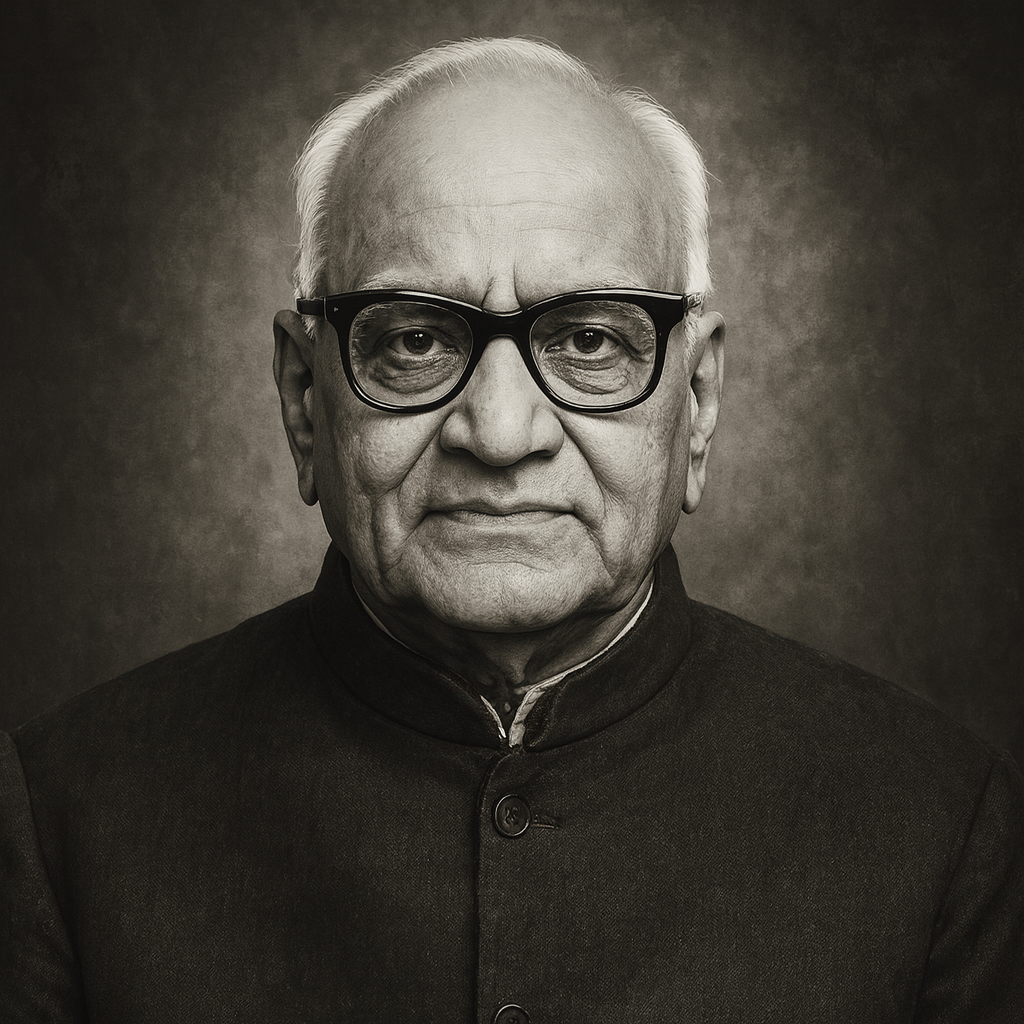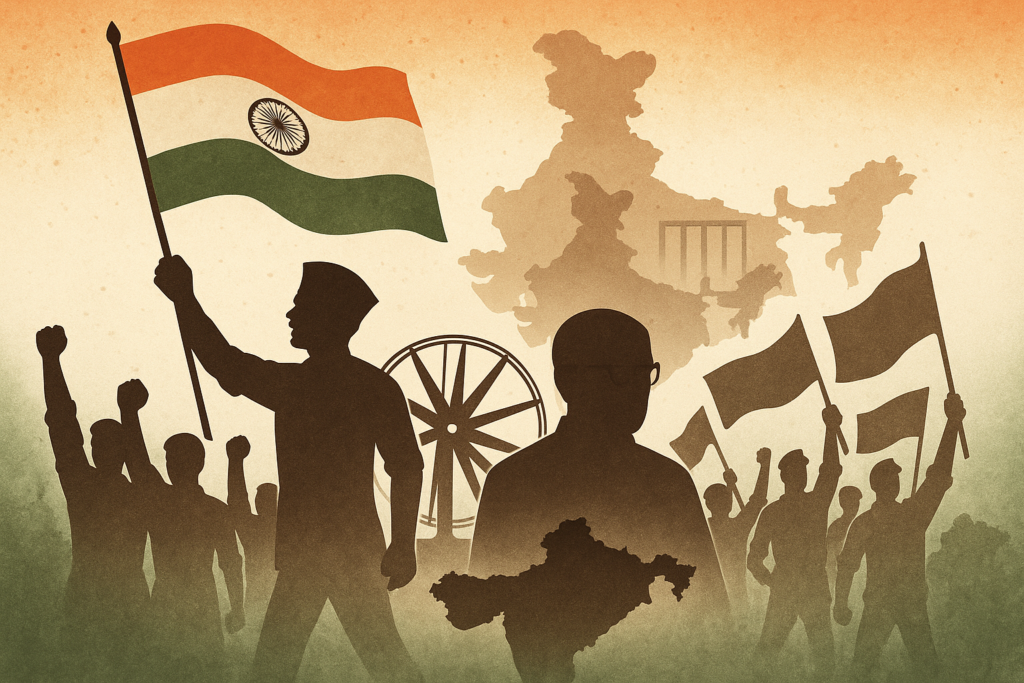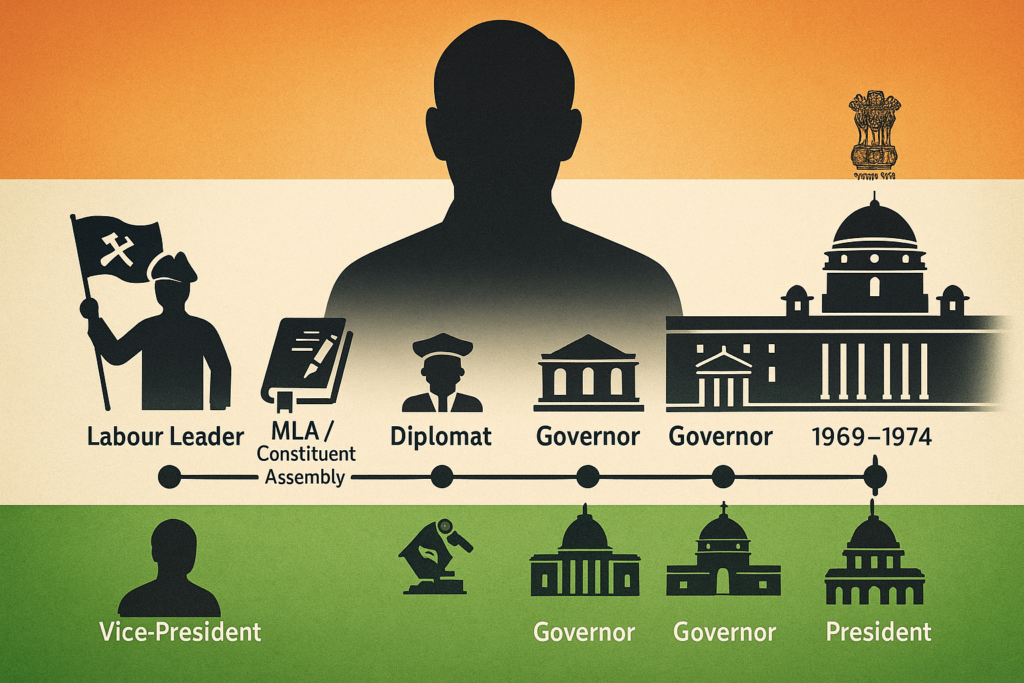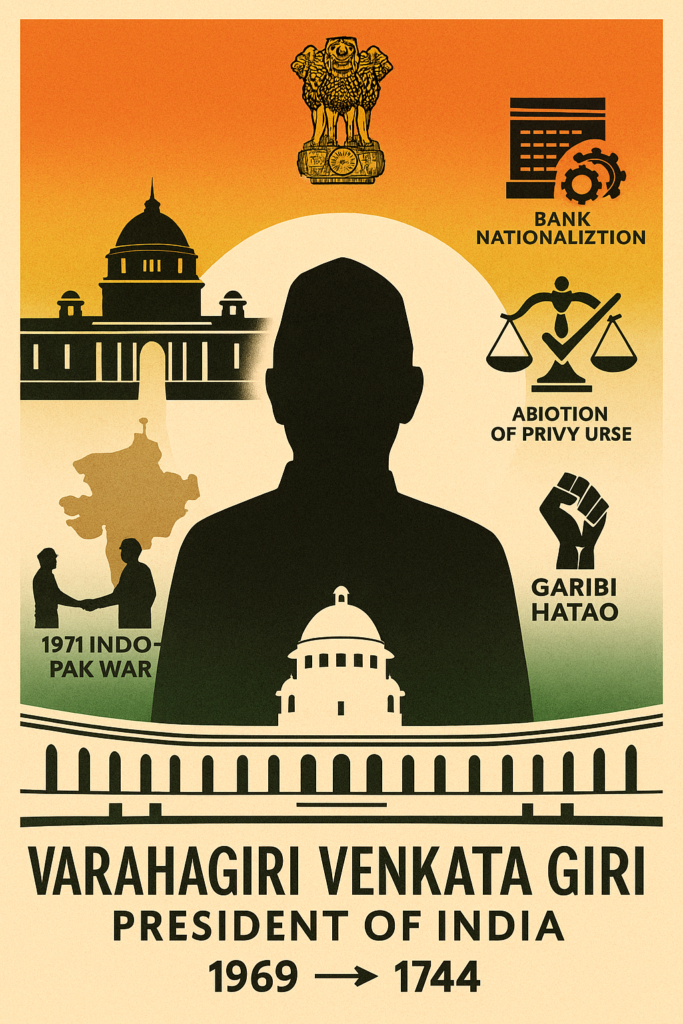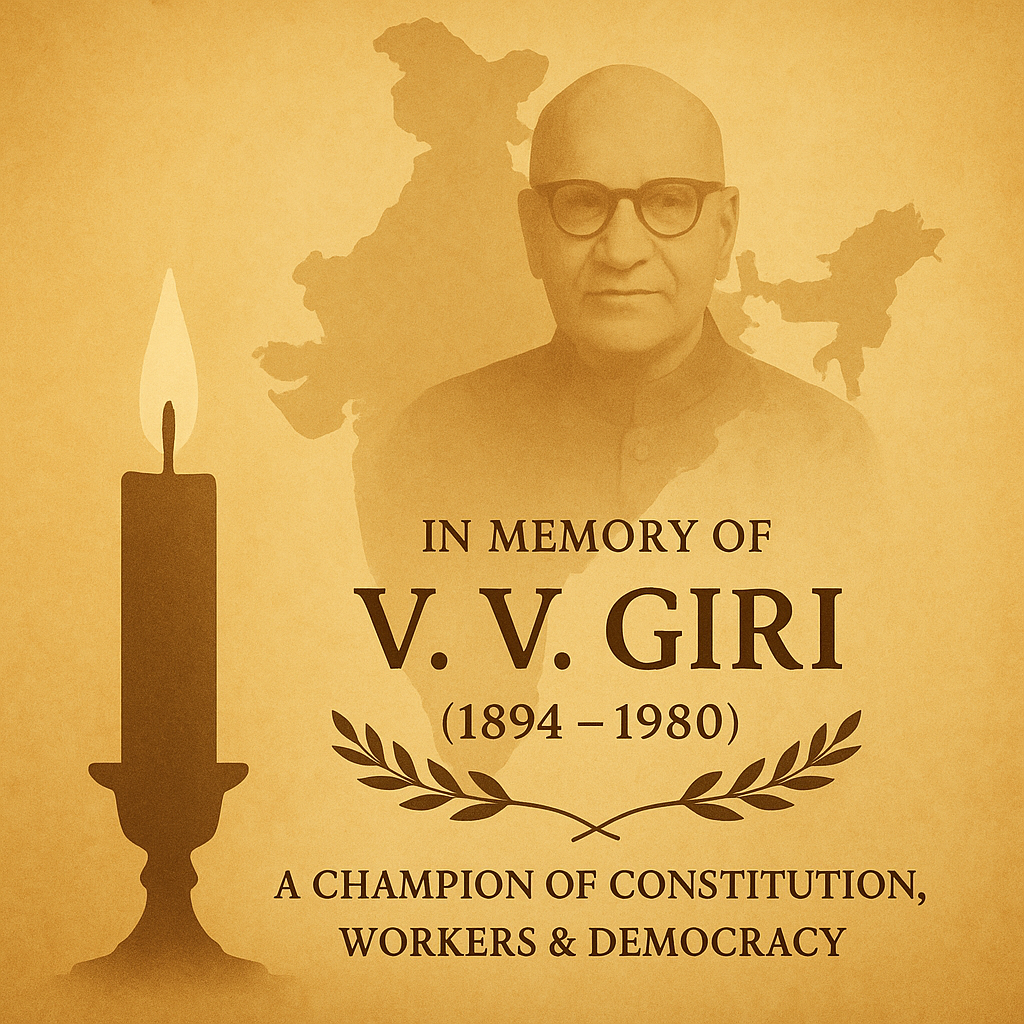Biography of Varahagiri Venkata Giri
An inspiring account of V. V. Giri — freedom fighter, labour leader and the 4th President of India.

Varahagiri Venkata Giri (10 August 1894 – 24 June 1980) was a prominent Indian politician whose life was closely associated with the Indian freedom movement, labour rights and constitutional service to the nation. Below is an organized account of the major phases and achievements of his life.
Early Life and Education
Birth and Family
Born on 10 August 1894 in Berhampur (then in the Madras Presidency, now in Ganjam district, Odisha), V. V. Giri came from a socially conscious Telugu Brahmin family. His father, Varahagiri Venkata Ranga Naidu, was an eminent lawyer and a known nationalist, which influenced Giri's early political outlook.
Schooling and Higher Studies
Giri received his primary education in Berhampur and later graduated from Khalsa College, Madras. For higher studies he went to Ireland and enrolled at University College Dublin and King's Inns, where he studied law.
Influence of Ireland
While in Ireland, Giri was exposed to the Irish independence movement and active trade unionism. These experiences deepened his anti-colonial convictions and motivated his lifelong commitment to labour rights and social justice.
Contribution to the Freedom Struggle
On returning to India after his studies, Giri joined the Indian independence movement. He participated in political activities that opposed British rule and was imprisoned several times for his involvement. His early legal training and international exposure enabled him to contribute strategically to the freedom movement and to the organisation of labour.
Political and Administrative Career
Labour Leadership
Giri became actively involved in labour politics and worked with the All India Trade Union Congress (AITUC). He played a leading role in organising trade unions and fought for workers' rights across multiple industries.
Governor
He served as Governor in several states, including Uttar Pradesh, Mysore (now Karnataka), and Kerala, where he upheld constitutional responsibilities with dignity.
Vice-President and Acting President (1967–1969)
Giri served as Vice-President of India and became Acting President following the death of President Dr. Zakir Hussain. During this period he performed the duties of the presidency with sobriety and balance.
President of India (1969–1974)
On 24 August 1969, Varahagiri Venkata Giri was elected the 4th President of India. He was elected as an independent candidate and served a full term from 1969 to 1974. His tenure is remembered for its constitutional propriety and for the dignity he brought to the office.
Honours and Awards
In recognition of his long public service, V. V. Giri received India's highest civilian award, the Bharat Ratna (awarded in 1975).
Death and Legacy
Varahagiri Venkata Giri passed away on 24 June 1980 in Madras (now Chennai), Tamil Nadu. He is remembered as a dedicated freedom fighter, an outstanding labour leader, and a principled constitutional functionary. His life remains an inspiring example of commitment to democracy, social justice and public service.
Concise Timeline
- 1894 — Born in Berhampur (10 August).
- Early 1900s–1920s — Education in Madras and Ireland; involvement with Irish independence and trade unions.
- 1920s–1940s — Active in Indian freedom movement; work in labour organisation; multiple imprisonments.
- Post-Independence — Labour leadership, governor posts, Vice-President.
- 1969–1974 — President of India (4th President).
- 1975 — Awarded the Bharat Ratna.
- 1980 — Died on 24 June in Madras (Chennai).
Conclusion
Varahagiri Venkata Giri's journey — from a socially aware childhood to international exposure, labour activism, and the highest constitutional office — exemplifies a life dedicated to public service. His commitment to workers' rights, democratic principles and national unity continues to inspire generations.
Education
Varahagiri Venkata Giri’s education played a crucial role in shaping his personality, leadership qualities, and political thinking. His academic journey—from India to Ireland—helped him gain knowledge as well as social and political awareness. Let us understand his educational life in detail.
Elementary and Secondary Education
- Venkata Giri’s early education took place in his hometown Berhampur (present-day Odisha).
- He was a brilliant student and showed interest not only in studies but also in social issues from a young age.
Higher Education in India
- He completed his college education from Khalsa College, Madras (now Chennai).
- During this period, he became more aware of Indian political ideas and the ongoing freedom struggle.
Education Abroad – Ireland
- For higher studies, Venkata Giri went to Ireland and enrolled at University College Dublin.
- He studied Law and later received his Barrister degree from King’s Inns, London.
Experiences During Studies in Ireland
- His education went beyond academic learning; he engaged with the Irish Independence Movement and trade union struggles.
- He was deeply influenced by the Irish people's fight against British rule.
- This exposure strengthened his inclination towards workers’ rights, social justice, and political self-governance (Swaraj).
Impact of Education
- His education abroad gave him a global perspective on politics and human rights.
- After returning to India, he chose to prioritise the freedom struggle and labour movement over legal practice.
Conclusion
V. V. Giri’s education was not merely about earning degrees. He adopted learning as a tool to fight for social justice, democracy, and freedom. His educational experiences deeply shaped his leadership and decision-making abilities, making him one of India’s most informed and visionary leaders.
Contribution in Freedom Struggle
Varahagiri Venkata Giri’s contribution to India’s independence movement was significant and inspiring. He strengthened the struggle not only politically but also through labour movements and his advocacy for social justice. Here is a detailed look at his role in the freedom struggle:
1. Association with the Freedom Movement
- After returning to India in the 1920s, Giri actively joined the Indian National Congress.
- He was influenced by Mahatma Gandhi’s principles and adopted non-violence and Satyagraha.
- He protested against British rule and was imprisoned multiple times for participating in national movements.
2. Contribution Through Labour Movements
- Seeing the exploitation of workers under British rule, Giri immersed himself in labour movements.
- He played a key role in the All India Trade Union Congress (AITUC).
- He organised workers, encouraged them to demand their rights, and mobilised them as a force in the freedom struggle.
- This was significant because he expanded the struggle beyond political platforms to economic and social justice.
3. Non-Cooperation Movement and Imprisonment
- Giri actively participated in Mahatma Gandhi’s Non-Cooperation Movement (1920).
- He delivered speeches, organised protests, and worked with groups challenging British policies.
- Due to his activities, he was arrested several times and spent long periods in jail.
4. Advocacy for Workers’ Interests
- He advocated for workers in the railway, textile, and mining sectors.
- His efforts increased political awareness among the working class.
- He encouraged workers to join the national movement for freedom and justice.
5. Activism in South India
- Giri was highly active in South India, especially in the regions of Andhra Pradesh and the Madras Province.
- He emerged as one of the leading figures of the trade union movement in Southern India.

Conclusion
V. V. Giri played a vital role in the freedom struggle as a dedicated nationalist, progressive labour leader, and committed supporter of non-violent resistance. His efforts were not limited to ending British rule; he also helped lay the foundation of social and economic equality in independent India. His contributions continue to inspire generations striving for justice and democracy.
Political and Administrative Career
Varahagiri Venkata Giri’s political and administrative career was vast and multifaceted. He served the nation as a labour leader, legislator, governor, vice-president, and eventually the President of India. Below is a step-by-step overview of his political journey.
1. Labour Leader and MLA
- After the freedom struggle, Giri became deeply involved in labour movements and political activities.
- He served as chairman of several trade union organisations and played a leading role in the All India Trade Union Congress (AITUC).
- In 1937, he was elected to the Madras Legislative Assembly and became the Minister of Labour.
- He introduced reforms related to working hours, wages, and social security for industrial workers.
2. Member of the Constituent Assembly
- In 1947, Giri was nominated as a member of the Constituent Assembly, which was responsible for framing the Constitution of India.
- He strongly advocated labour rights and social justice during the drafting process.
3. Diplomatic and Administrative Responsibilities
- After independence, he represented India as a diplomatic envoy to various countries.
- He contributed to strengthening India’s global image on international platforms.
4. Service as Governor
V. V. Giri served as Governor in three major Indian states:
- Uttar Pradesh (1957–1960)
- Kerala (1960–1965)
- Mysore (now Karnataka) (1965–1967)
He was widely respected as a constitutional and impartial governor who upheld democratic values.
5. Vice President of India (1967–1969)
- In 1967, he was elected the Vice-President of India.
- As Vice-President, he served as the Chairman of the Rajya Sabha and maintained parliamentary etiquette and discipline.
6. President of India (1969–1974)
- After the death of Dr. Zakir Husain in 1969, Giri became the Acting President.
- Later that same year, he contested as an independent candidate and was elected the 4th President of India.
- He remains the only President of India elected as an independent (non-party) candidate.
7. Bharat Ratna Award (1975)
- In 1975, Varahagiri Venkata Giri was honoured with India’s highest civilian award, the Bharat Ratna.
Conclusion
Varahagiri Venkata Giri was a leader who dedicated his life to the values of labour rights, constitutional integrity, and social equality. His political and administrative journey stands as a model of true democratic service.
Labour Leader
Varahagiri Venkata Giri is remembered as one of India’s most influential labour leaders. Beyond politics, he was a social reformer who worked at the grassroots level for the welfare of workers, labourers, and trade unions. His contribution to the labour movement has left a lasting impact on Indian society and labour laws.
1. Beginning of His Association with Labour Movements
- After returning from abroad in the 1920s and observing the exploitative conditions of workers, he became committed to improving their lives.
- He believed that freedom would hold true meaning only when the weakest sections of society received justice.
2. Role in the All India Trade Union Congress (AITUC)
- Giri played a crucial role in the AITUC and also served as its Chairman.
- He helped organise industrial workers and strengthened their voice before the government.
3. Struggle for Workers’ Rights
- He worked for minimum wages, limited working hours, workplace safety, and insurance against sickness and accidents.
- He strongly advocated collective bargaining so that workers could negotiate as a united force.
4. Labour Minister of Madras Province (1937)
- As Labour Minister in the 1937 Congress Government of Madras, he implemented several landmark reforms:
- Introduction of the 48-hour work week
- Protection laws for women and child workers
- Formal recognition of trade unions
5. Advocate of Peaceful Solutions
- Giri always prioritised non-violent, dialogue-based solutions to industrial disputes.
- He emphasised that communication and mutual understanding should guide relations between workers and industrialists.
6. Worker Education and Awareness
- He encouraged worker education, leadership training, and organisational awareness.
- He believed that workers must understand their rights to achieve true empowerment.
Giriji’s Legacy
- He is remembered as the “President of the Workers”.
- He helped strengthen the foundation of India’s labour laws and trade union movement.
Conclusion
V. V. Giri’s contribution to the labour movement shaped modern India’s labour laws and policies. He demonstrated that leadership is not just about holding office but working for justice at the grassroots level.
Governor Tenure
Varahagiri Venkata Giri’s tenure as Governor highlighted his constitutional commitment, administrative experience, and political impartiality. He served as Governor in three major Indian states and earned respect for his balanced and principled approach.
1. Governor of Uttar Pradesh (1957–1960)
- Uttar Pradesh, India’s largest state, required strong administrative capability.
- Giri maintained constitutional balance between the administration and the elected leadership.
- He acted as a bridge between the bureaucracy and public representatives.
2. Governor of Kerala (1960–1965)
- His tenure in Kerala was challenging due to political instability and the rise of leftist movements.
- Giri maintained fair dialogue with political parties and strictly adhered to constitutional limits.
- Despite frequent changes in government, he maintained neutrality and dignity.
3. Governor of Mysore (now Karnataka) (1965–1967)
- In Mysore, he focused on administrative efficiency and developmental activities.
- He encouraged initiatives related to education, labour welfare, and cultural development.
Highlights of His Governorship
- He was regarded as a fair, dignified, and thoughtful constitutional governor.
- He never misused his authority or encouraged political interference.
- He served as an effective link between the Central and State Governments.
- He consistently upheld the dignity of democracy and the Constitution.
Conclusion
Varahagiri Venkata Giri’s tenure as Governor is remembered as an example of ideal constitutional conduct. He proved that the Governor’s office plays a vital role in protecting the Constitution and maintaining political balance.
Political and Administrative Career
Varahagiri Venkata Giri’s political and administrative career was vast, impactful, and multifaceted. He served India as a labour leader, legislator, governor, vice-president, and eventually as the President of India. His journey reflects his commitment to public service, social justice, and constitutional values.
1. Labour Leader and MLA
- After the freedom struggle, Giri ji moved from labour movements into active politics.
- He headed several trade union organisations and played an important role in the All India Trade Union Congress (AITUC).
- In 1937, he was elected to the Madras Legislative Assembly and became the Minister of Labour.
- He introduced reforms related to working hours, wages, and social security for workers.
2. Member of the Constituent Assembly
- In 1947, Giri ji was nominated as a member of the Constituent Assembly, which drafted the Constitution of India.
- He voiced concerns about labour welfare, worker rights, and social justice.
3. Diplomatic and Administrative Roles
- After independence, the Indian government appointed him as a diplomatic representative in various countries.
- He helped enhance India’s global presence at international platforms.
4. Service as Governor
V. V. Giri served as Governor in three major states:
- Uttar Pradesh (1957–1960)
- Kerala (1960–1965)
- Mysore / Karnataka (1965–1967)
He was known for being an impartial and constitutionally responsible governor who safeguarded democratic norms.
5. Vice-President of India (1967–1969)
- He became India’s third Vice-President in 1967.
- As Chairman of the Rajya Sabha, he maintained parliamentary dignity and order.
- He worked with fairness, balancing both the government and the opposition.
6. President of India (1969–1974)
- Following the death of President Dr. Zakir Husain, Giri became Acting President.
- Later, he contested as an Independent candidate and was elected the 4th President of India.
- He remains the only President elected as an independent candidate.
7. Bharat Ratna (1975)
- In 1975, he was awarded the Bharat Ratna, India’s highest civilian honour.
Conclusion
V. V. Giri dedicated his life to protecting constitutional values, uplifting labour rights, and promoting social justice. His political journey reflects the true spirit of democratic leadership and public service.
Labour Leader
Varahagiri Venkata Giri is regarded as one of the most influential labour leaders in India’s history. Beyond being a politician, he was a reformer who worked at the grassroots level for the rights and dignity of workers and trade unions.
1. Beginning of Labour Movement Involvement
- Upon returning to India in the 1920s–1930s, he witnessed the exploitative conditions of Indian workers.
- He believed that freedom would be meaningful only when the weakest sections of society received justice.
2. Role in AITUC
- Giri ji played a pivotal role in the All India Trade Union Congress (AITUC).
- He served as its Chairman and worked to organise industrial labourers.
- He ensured workers’ voices were heard by both government and industry.
3. Fight for Workers’ Rights
- He worked on issues such as minimum wages, limited working hours, workplace safety, and insurance.
- He promoted collective bargaining to strengthen workers’ negotiation power.
4. Labour Minister in Madras Province (1937)
- As Minister of Labour, he introduced landmark reforms, including:
- 48-hour work week
- Protection laws for women and child labourers
- Recognition of trade unions
5. Supporter of Peaceful Movements
- He always believed in non-violence and dialogue-based dispute resolution.
- He encouraged compromise rather than conflict between workers and employers.
6. Worker Education and Awareness
- He promoted worker education, leadership development, and organisational training.
- He believed workers must know their rights to fight for change.
Legacy
V. V. Giri is still remembered as the “President of the Workers.” His efforts strengthened the foundation of India’s labour laws and trade unions. He proved that a true leader stands with the working class and fights for their dignity.
Conclusion
His contributions shaped modern labour policies in India. Giri ji showed that leadership is not only about governance but also about ensuring justice and equality for every citizen.
Governor
V. V. Giri’s governor tenures showcased his administrative experience, loyalty to the Constitution, and political neutrality. He served as governor in three major Indian states.
1. Governor of Uttar Pradesh (1957–1960)
- Uttar Pradesh, being India’s largest state, required strong administrative understanding.
- Giri ji maintained constitutional balance and acted as a bridge between the bureaucracy and elected leaders.
2. Governor of Kerala (1960–1965)
- His tenure was marked by political instability and growing leftist movements.
- He maintained fair communication with all political parties.
- He strictly adhered to constitutional limits despite frequent government changes.
3. Governor of Mysore / Karnataka (1965–1967)
- He focused on administrative efficiency and development work.
- He promoted education, labour welfare, and cultural initiatives.
Highlights as Governor
- Known for fairness, dignity, and thoughtful decision-making.
- Never misused power or encouraged political interference.
- Maintained the dignity of democracy and the Constitution.
Conclusion
V. V. Giri’s gubernatorial tenure remains a model of constitutional conduct. He proved that the office of Governor is vital for maintaining political stability and constitutional governance.
Vice President of India (1967–1969)
Varahagiri Venkata Giri’s tenure as Vice-President was a crucial and sensitive phase in Indian democracy. During this period, he served as Chairman of the Rajya Sabha and upheld the dignity and impartiality of the office.
Appointment
- Elected in 1967 as India’s third Vice-President.
- Responsibilities included acting as President when required and serving as Chairman of the Rajya Sabha.
Role as Rajya Sabha Chairman
- He conducted the proceedings of the House in a peaceful, dignified, and fair manner.
- Maintained balance between the government and opposition.
- Oversaw discussions on several important bills.

Political Context
- A period of political instability in India.
- Split in the Congress Party (Syndicate vs Indira Gandhi faction).
- Death of President Dr. Zakir Husain in 1969.
Became Acting President
- On 3 May 1969, following the death of Dr. Zakir Husain, Giri became Acting President.
- He provided stable constitutional leadership during a turbulent period.
- He later resigned as Vice-President to contest the presidential election.
Key Qualities
- Fairness: Treated MPs of all parties with equal respect.
- Experience: Deep understanding of labour issues, constitutional law, and administration.
- Popularity: Admired by workers, intellectuals, and political leaders.
Conclusion
V. V. Giri’s Vice-Presidential tenure is remembered for maintaining constitutional decorum, parliamentary dignity, and political balance—qualities that later helped him rise to the Presidency.
Fourth President of India (1969–1974)
Varahagiri Venkata Giri served as the fourth President of India during a highly transformative period in Indian politics. He is remembered as the first and only President elected as an Independent candidate.
Background to Becoming President
- President Dr. Zakir Husain passed away on 3 May 1969.
- Vice-President Giri assumed charge as Acting President.
- The Congress Party split into two groups—Syndicate leaders vs Indira Gandhi.
- The Syndicate nominated Neelam Sanjiva Reddy, while Indira Gandhi supported Giri as an Independent candidate.
- Giri won the 1969 Presidential election.
Presidential Tenure (1969–1974)
1. Constitutional Role
- He maintained neutrality during political conflicts.
- Upheld the President’s role as the guardian of constitutional balance.
2. Relationship with Indira Gandhi
- Supported several key reforms such as Bank Nationalisation and Abolition of Privy Purse.
- Despite his support, he never compromised constitutional boundaries.
3. Historical Events During His Tenure
- Bank Nationalisation (1969): Approved major economic reforms.
- Abolition of Privy Purse (1971): Ended financial privileges of princely states.
- 1971 Indo–Pak War: India’s victory and creation of Bangladesh.
- 1971 General Elections: Indira Gandhi’s historic win and “Garibi Hatao” agenda.
Award
- Received the Bharat Ratna in 1975.
Characteristics as President
- Constitutional Loyalty: Safeguarded the Constitution even during political turbulence.
- Progressive Thinking: Supported reforms aimed at equality and inclusive growth.
- People’s President: Advocated for the working class and ordinary citizens.
Conclusion
V. V. Giri’s presidential tenure coincided with political conflict, social transformation, and economic reform. He upheld the dignity of the Presidency and proved that the President can be an active guardian of democracy, justice, and constitutional integrity.
Political and Administrative Career
Varahagiri Venkata Giri made a remarkable and multifaceted contribution to Indian politics and public administration. From being a labour leader to becoming Governor, Vice-President and President of India, he served the nation with integrity and dedication. Below is a step-by-step overview of his political and administrative journey.
1. Labour Leader and MLA
- After the freedom struggle, Giri transitioned from labour movements into active politics.
- He chaired several trade union organisations and played a key role in the All India Trade Union Congress (AITUC).
- In 1937, he was elected to the Madras Legislative Assembly and became the Minister of Labour.
- He introduced reforms related to working hours, wages, and social security for workers.
2. Member of Constituent Assembly
- In 1947, Giri was nominated to the Constituent Assembly, which framed the Constitution of India.
- He advocated strongly for labour rights and social justice.
3. Diplomatic and Administrative Responsibilities
- After independence, he served as India’s diplomatic representative in various countries.
- He played a role in strengthening India’s global image on international platforms.
4. Service as Governor
Giri served as Governor in three major Indian states:
- Uttar Pradesh (1957–1960)
- Kerala (1960–1965)
- Mysore (now Karnataka) (1965–1967)
He was known as an impartial and constitutional governor who upheld democratic values with discipline and fairness.
5. Vice-President (1967–1969)
- In 1967, he was elected the Vice-President of India.
- As Chairman of the Rajya Sabha, he maintained decorum and conducted proceedings dignifiedly.
6. President of India (1969–1974)
- After the death of President Dr. Zakir Hussain, Giri became the Acting President.
- He later contested as an independent candidate and was elected as the 4th President of India.
7. Bharat Ratna
- In 1975, he was honoured with Bharat Ratna, India’s highest civilian award.
Conclusion
Giri’s political and administrative life reflected his commitment to workers, constitutional values and democratic ethics. His career remains an ideal example of public service in India.
Labour Leader
V. V. Giri is regarded as one of the most influential labour leaders in Indian history. A social reformer at heart, he worked tirelessly at the grassroots level for the rights of workers, trade unions and the working class.
1. Beginning of the Labour Movement
- After returning to India in the 1920s, he witnessed widespread exploitation of workers.
- He believed freedom would be meaningful only if the weakest sections received justice.
2. Role in AITUC
- Giri played a major role in the All India Trade Union Congress (AITUC).
- He also served as its chairman and organised industrial labourers across various sectors.
3. Fight for Workers’ Rights
- He advocated for minimum wages, limited working hours, workplace safety, and insurance for sickness and accidents.
- He promoted collective bargaining to strengthen workers’ voices.
4. Labour Minister in Madras (1937)
As Labour Minister, he introduced several landmark reforms:
- 48-hour workweek
- Special laws for women and child workers
- Recognition of trade unions
5. Supporter of Peaceful Movements
- Giri believed in dialogue-based, non-violent solutions.
- He emphasised cooperation between workers and industrialists instead of conflict.
6. Worker Education
- He encouraged worker education, leadership development and organisation.
- He believed workers must know their rights to achieve meaningful change.
Legacy
Giri is often remembered as the “President of the Workers”. His efforts strengthened the foundation of labour laws and trade unions in India.
Governor Tenure
V. V. Giri’s tenure as Governor showcased his administrative capability, constitutional integrity and political impartiality.
1. Governor of Uttar Pradesh (1957–1960)
- Handled the administration of India’s largest state with balance and dignity.
- Acted as a bridge between the bureaucracy and elected representatives.
2. Governor of Kerala (1960–1965)
- Kerala faced political instability during this period.
- Giri facilitated fair dialogue among political parties and followed constitutional norms strictly.
- Despite frequent government changes, he remained absolutely impartial.
3. Governor of Mysore (1965–1967)
- Took interest in improving administrative efficiency and labour welfare.
- Encouraged development in education and cultural activities.
Highlights
- Known for fairness and constitutional discipline.
- Avoided political interference and upheld democratic dignity.
- Maintained smooth relations between Central and State governments.
Vice President of India (1967–1969)
V. V. Giri’s tenure as Vice-President was an important and sensitive period in Indian democracy. As Chairman of the Rajya Sabha, he demonstrated dignity, efficiency and impartiality.
Appointment
- Elected in 1967 as the Third Vice-President of India.
- His primary responsibilities included acting in the absence of the President and chairing the Rajya Sabha.
Role as Chairman of Rajya Sabha
- Ensured peaceful and dignified conduct of proceedings.
- Maintained harmony between the government and opposition benches.
- Oversaw discussions on important bills during his tenure.
Political Context
- India was facing political instability.
- Congress was divided between the Syndicate and Indira Gandhi factions.
- President Dr. Zakir Hussain passed away in 1969.
Became Acting President
- After Dr. Zakir Hussain’s death, Giri became the Acting President.
- He handled responsibilities with constitutional clarity and calm leadership.
- Later, he resigned to contest the presidential election.
Fourth President of India (1969–1974)
V. V. Giri’s presidency was one of the most significant periods in Indian political history, marked by political conflict, economic reforms and social transformation.
Background
- Following Dr. Zakir Hussain’s death, Giri became Acting President.
- Congress was split between the Syndicate and Indira Gandhi.
- Indira Gandhi supported Giri as an Independent Candidate.
Election Result
- Giri won the 1969 Presidential Election.
- He remains India's first and only Independent candidate elected President.
Presidential Tenure (1969–1974)
- Maintained neutrality and upheld constitutional values.
- Approved major decisions like the nationalisation of banks (1969) and abolition of privy purses (1971).
- Oversaw major events such as:
- 1971 Indo-Pak War → Creation of Bangladesh
- 1971 Lok Sabha Elections → “Garibi Hatao” campaign
Characteristics as President
- Allegiance to the Constitution – Maintained dignity despite political pressures.
- Progressive thinking – Supported social and economic reforms.
- People’s President – Advocated for the working class and common people.
Honours and Awards
V. V. Giri received numerous awards in recognition of his contributions to labour welfare, democracy and constitutional values.
1. Bharat Ratna (1975)
- Awarded India’s highest civilian honour.
- Recognised for his contributions to labour movements, political leadership and presidential service.
- He is the only Indian President elected as an Independent candidate who was later awarded the Bharat Ratna.
2. Honorary Degrees
- Received honorary doctorates (LL.D.) from several major universities in India and abroad.
- Recognised for contributions to justice, constitutionalism and labour welfare.
3. Recognition by Educational Institutions
- Universities launched lecture series, scholarships and labour study centres in his name.
4. Monuments and Memorials
- Roads, colleges, government buildings and labour organisation offices were named in his honour.
Death
V. V. Giri passed away on 24 June 1980 at the age of 91, marking the end of an era in Indian public life.
Death and Funeral
- Date of Death: 24 June 1980
- Place: India
- He had been suffering from health issues for some time.
Tributes
- A wave of grief spread across the country.
- The government and citizens remembered him as a great leader, labour reformer and constitutional figure.
- Memorials and commemorative events were organised in his honour.
Legacy
- His contribution to labour welfare, democracy and constitutionalism continues to inspire India.
- He is remembered not only as a President but as a champion of the working class and social justice.
Conclusion
Varahagiri Venkata Giri’s life is an inspiring story of dedication, constitutional integrity and service to the nation. From his active role in the freedom struggle to his work as a labour leader, governor, vice-president and president, he strengthened democratic values at every step.
- As a freedom fighter, he helped shape India’s political future.
- As a labour leader, he fought tirelessly for workers’ rights.
- As Governor, he upheld constitutional dignity with impartiality.
- As Vice-President and President, he guided India through sensitive political phases.
- He remains the only independent candidate elected President and later honoured with the Bharat Ratna.
His life teaches that true leadership is defined not by position but by justice, honesty and service to the people. V. V. Giri’s ideals continue to inspire leaders and citizens of India.
References

- Government of India Archives — Records related to Presidents and Vice Presidents of India.
- Parliament of India – Rajya Sabha Secretariat: Documents on the tenure of Vice Presidents.
- National Archives of India – Constituent Assembly Debates and documents.
- Ministry of Labour & Employment – Historical Labour Movement Records.
- Books:
- Presidents of India – Publications Division, Government of India.
- Labour Movements in India – Various scholarly authors.
- Newspapers and journals from the 1960–1980 period documenting public life and speeches of V. V. Giri.
- University College Dublin & King's Inns historical alumni records.

